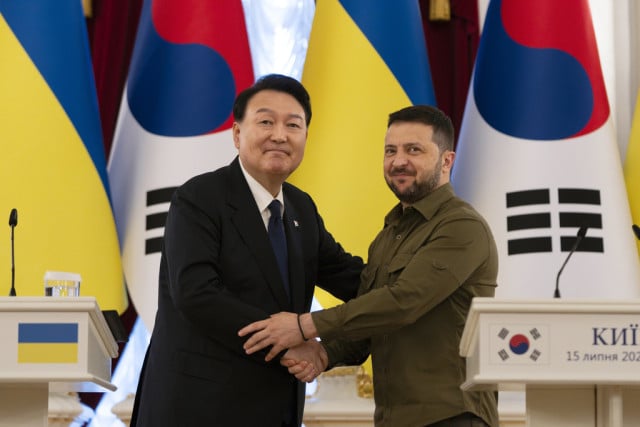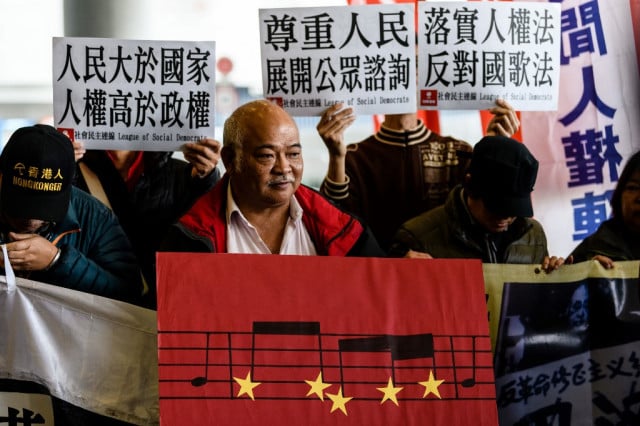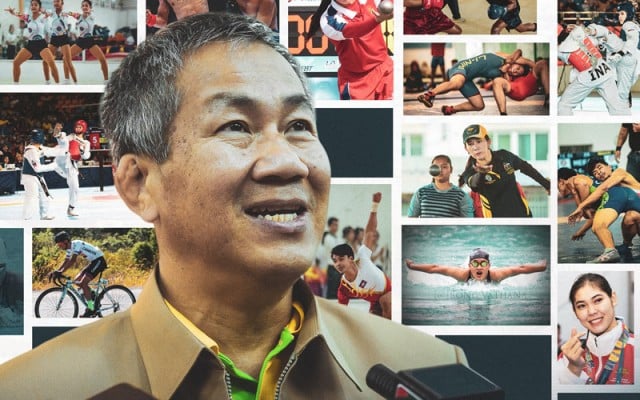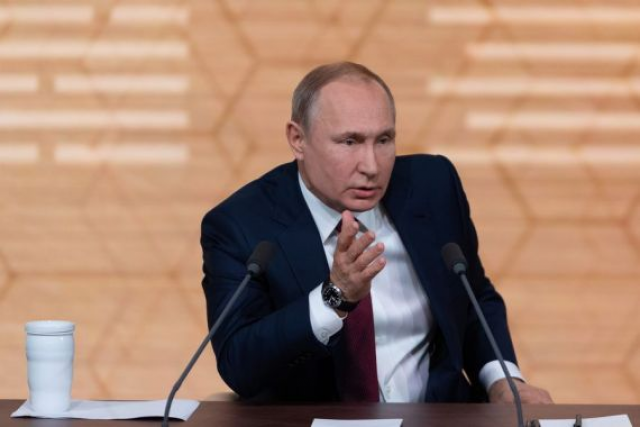South Korea to Expand Support for Ukraine as President Yoon Suk Yeol Makes a Surprise Visit

- By Associated Press (AP)
- July 16, 2023 8:50 AM
KYIV — South Korean President Yoon Suk Yeol made a surprise visit to Ukraine on Saturday, offering support for the invaded country in its war with Russia while demonstrating his own nation's cooperation with NATO.
Yoon’s office said he traveled to Ukraine with his wife, Kim Keon Hee, following trips to Lithuania for a NATO summit and to Poland. It’s his first visit since Russia invaded Ukraine in February 2022.
Yoon toured Bucha and Irpin, two small cities near Kyiv where bodies of civilians were found in the streets and mass graves after Russian troops retreated from the capital region last year. He laid flowers at a monument to the country's war dead, before he sat down for a summit with Ukrainian President Volodymyr Zelenskyy.
South Korea, a key U.S. ally in Asia, joined international sanctions against Russia and has provided Ukraine with humanitarian and financial support to Ukraine. But the Asian nation, a growing arms exporter, hasn't provided weapons to Ukraine in line with its long-standing policy of not supplying arms to countries actively engaged in conflict.
During a joint news conference with Zelenskyy later Saturday, Yoon announced plans to expand support shipments to Ukraine but didn't touch upon weapons supplies.
Yoon began his statement with a mention of the U.N. forces’ support of South Korea during the 1950-53 Korean War that helped repel a North Korean invasion.
“The current situation facing Ukraine reminds us of the past situation of the Republic of Korea," Yoon said.
Zelenskyy thanked Seoul for its “firm support of Ukraine’s sovereignty and territorial integrity” and the “significant political, security, economic and humanitarian aid” it has supplied since the start of Russia’s invasion.
Yoon said that South Korea will increase the shipments of nonlethal military items such as body armor and helmets this year. He said that South Korea will also provide humanitarian aid worth $150 million this year, up from $100 million last year. He said that South Korea has also sent the de-mining equipment and other aid items that had been requested by Ukraine.
Yoon said that he and Zelenskyy agreed on cooperating on post-war reconstruction efforts in Ukraine. Yoon said South Korea will also launch a scholarship fund named after him and Zelenskyy to expand support for Ukrainian students in South Korea.
South Korea isn't a NATO member, but like Japan, Pakistan and a handful of other countries, it's considered a global partner of the military alliance. Japanese Prime Minister Fumio Kishida visited Ukraine in March.
In his recent written responses to questions from The Associated Press, Yoon said that the security of the Atlantic and Indo-Pacific regions is closely intertwined, saying: “In particular, the war in Ukraine has reminded us all that a security crisis in one particular region can have a global impact.”
Yoon took office last year amid a mix of tough foreign policy challenges such as North Korea’s advancing nuclear program and the intensifying rivalry between the U.S., South Korea’s main security ally, and China, its biggest trading partner.
During a January visit to South Korea, NATO Secretary-General Jens Stoltenberg called for the country to provide direct military support to Ukraine, saying Kyiv was in urgent need of weapons to fight off the prolonged Russian invasion.
In May, when Yoon met Ukrainian first lady Olena Zelenska in Seoul, the president said he would expand South Korea's nonlethal aid to Ukraine. Yoon’s office said at the time that Zelenska made no request for South Korean weapons supplies.
Later in May, Yoon and Zelenskyy met for the first time on the sidelines of a Group of Seven industrialized nations summit in Hiroshima, Japan. Zelensky thanked South Korea for its humanitarian shipments of medicines, computers and generators and requested additional provisions of non-lethal items, Yoon’s office said.
Since Russia’s full-scale invasion of Ukraine, South Korea has reached billions of dollars worth of deals to provide tanks, howitzers, fighter jets and other weapons systems to NATO member Poland.
An American official said in November that the United States had agreed to buy 100,000 artillery rounds from South Korean manufacturers to provide to Ukraine, although South Korean officials have maintained that the munitions were meant to refill depleted U.S. stocks.
“Yoon’s visit to Ukraine reflects his globally-minded foreign policy and shows South Korean solidarity with NATO partners in defending the rules-based international order,” Leif-Eric Easley, a professor at Ewha University in Seoul, said. “Seoul’s support of Ukraine includes not only humanitarian assistance, but also arms sales to backfill NATO countries providing military aid to Kyiv, and plans for post-conflict reconstruction of infrastructure.”
Yoon and his wife's visit came two days after Russia launched another barrage of Iranian-made drones at the Kyiv region. Ukrainian officials said their air defenses intercepted the drones but that wreckage fell on four districts of the capital, wounding two people and destroying several homes.
Although Kyiv didn't come under attack in the hours before the South Korean president's arrival, Ukrainian forces on Friday and overnight downed 10 Russian drones across the country, the Ukrainian air force reported Saturday.
In a Telegram post, the air force added that Moscow fired six Iranian-made Shahed drones at Ukraine’s south and east during the night, four of which were shot down. It did not immediately give details of any casualties or damage.
In southern Ukraine's Zaporizhzhia province, where Ukraine has been engaged in a counteroffensive to take back occupied territory, there were 45 air and artillery attacks between Friday and Saturday, Gov. Yurii Malashka reported.
Russian forces shelled neighboring Kherson province 70 times over the same period, using mortars, artillery, drones, tanks, aviation and multiple rocket launchers, Gov. Oleksandr Prokudin said Saturday. No civilians were wounded, he said.
Russian shelling over the past day killed one civilian in eastern Ukraine's Donetsk province, Gov. Pavlo Kyrylenko reported Saturday. Ukrainain forces have been pressing their counteroffensive in the area, inching their way from Velyka Novosilka down toward the Russian-occupied city of Mariupol.
Russia's Federal Security Service, or FSB, said Saturday that a group of neo-Nazis was arrested in connection with a Ukrainian plot to kill Margarita Simonyan, editor-in-chief of the state-funded RT international television channel, and journalist and celebrity Ksenia Sobchak.
When Russian President Vladimir Putin ordered the full-scale invasion, he vowed to “denazify” Ukraine, alleging that radical neo-Nazi groups dominate the country led by a Jewish president. Kyiv and its Western allies dismissed his assertion as a bogus cover for an unprovoked act of aggression.
The FSB, which is the main successor to the KGB, didn't say how many people were arrested, but Russian news media later said seven suspects had been put in detention by a Moscow court.
The FSB said that the plot was organized at the direction of Ukraine's SBU security agency. But the FSB didn't provide any evidence of that, and there was no immediate comment from Ukraine.
Russia previously has charged Ukrainian authorities were behind the killings of nationalist television commentator Daria Dugina and popular pro-war blogger Vladlen Tatarsky.
Also Saturday, Russia's defense ministry said it had completed its planned spring call-up of 147,000 military conscripts, 12,500 more than in the previous year's draft.















